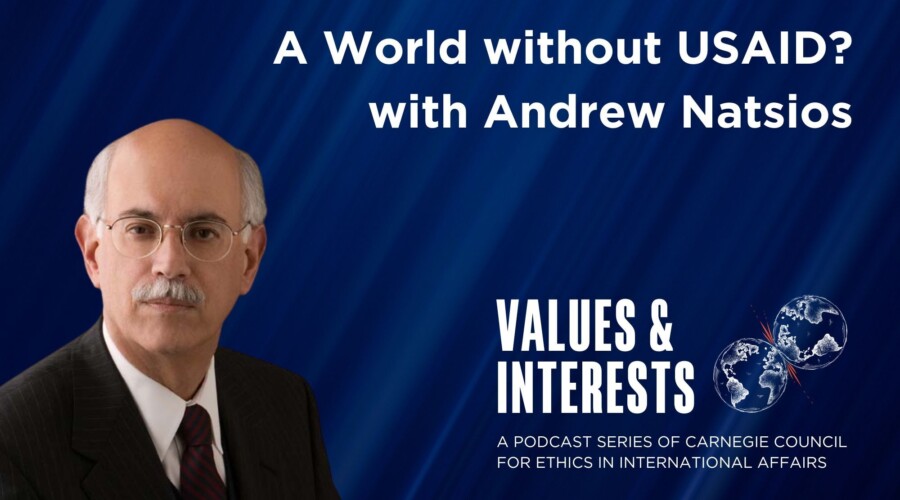A Lack of Vision
Governments at the UN are negotiating a new international structure for sustainable development that seeks to integrate social, economic, and environmental matters in a new fashion.
The Rio+20 Conference agreed to shut down the Commission on Sustainable Development and replace it with a high-level political forum on sustainable development and a reformed ECOSOC.
Meanwhile, long-standing revisions to weighted voting arrangements continue at the IMF and World Bank.
Governments are also engaged in a two-year process to redefine development goals after 2015.
And for the third year in a row, the General Assembly is negotiating a resolution on global governance.
Unfortunately none of these debates and changes help the UN system to improve its institutional responses to things like future financial crises. Nor do they even propose tools for enhanced monitoring of banks, or regulation of international firms that disrupt peace, security, or development.
And none of the debates envisage a fundamental new role in global governance for civil society organizations or multinational corporations, both of which are significant actors on a global scale.
Into the Breach Steps WEF
However, as a result of the 2008 financial crisis, key segments of the international elite became concerned that the global marketplace had become dangerously unstable. All the governmental mechanisms failed to prevent what should have been a domestic housing bubble and bankruptcy of one investment house from becoming an international crisis. Some of those in the financial elite even acknowledge that the global market and monetary system increased the uncontrollable transmission of financial instability.
One of these elite groups, the World Economic Forum, decided it was time to develop a new global governance structure, one that could replace the post-WWII architecture with something more responsive to the realities of globalization as they see it. This governance project at WEF involved 700 experts working in more than 40 thematic groups for a year and a half. The final report of their Global Redesign Initiative (GRI) is a series of broad introductory essays and 500 pages of specific task-force recommendations.
In 2012, the Center for Governance and Sustainability at UMass-Boston published an interactive Readers' Guide to the final GRI report to provide an introduction to these proposals and encourage critical evaluation of their ideas. One of the key premises of GRI is that the political actors on the global scene have changed and that it is appropriate to acknowledge that multinational corporations, nation-states (including the UN system), and selected civil society organizations are best able to jointly manage a globalized world—and ought to do so.
In WEF's view, multinationals, governments, and civil society have evolved relatively independent governance spaces on the international level. The economic governance space is dominated by corporations, while the inter-governmental space is seen by governments and the wider public as focused on the UN. The civil society governance space, as seen by WEF, is one that is successful in defining new issues and acts to transmit messages and ideas to and from developing countries and other important communities.
A key element of the GRI proposals is to connect these rather autonomous spaces through multi-stakeholder governance arrangements. Depending on the issues involved, WEF envisages that each joint governance activity would involve a diversity of combinations of executives, government representatives, and civil society leaders, and a diversity of institutional participants that may or may not include a selection of nation-states.
In their view, without such joint ventures to reassert effectiveness and legitimacy for globalization, systemic tensions will continue to challenge the foundations of the global market and international relations. This new global governance "partnership" structure clearly entails some quite radical changes for the United Nations and its specialized agencies.
The GRI thematic working groups offered a number of examples of how the de facto informal economic global governance processes managed chiefly by multinational corporations could be united under the wings of the UN system. This integration of global executives with UN diplomats and civil servants is seen as a way to rejuvenate the acceptance of globalization.
Their thinking is that if globalization leaders were more involved in the policy development and program implementation of the UN, then organizations and peoples throughout the world may well look more favorably on the legitimacy of their combined efforts. The benefits of conjoining the informal market-based system with the official state-centric system are that multinationals would no longer be outside the recognized governance gate, but would enter the system as equal or greater partners to governments in a transformed UN system.
A Path to Marginalization
GRI's proposals include a realignment of both the intergovernmental policy system and the role of the secretariats of the UN system. On the intergovernmental policy side, the GRI recommends three new institutional arrangements between governments, the private sector, and civil society. In WEF's view, the G20 has the best opportunity to provide intergovernmental leadership on a wide range of economic, social, and environmental areas. The GRI recommends that the G20 be institutionalized and engage with ECOSOC on a regular basis by having representatives of the current, former, and incoming leaders of the rotating G20 leadership brief ECOSOC on an annual basis. This proposal departs from the practice of the G7/G8, which keeps a good distance from the rest of the 187 countries at the UN.
In April of this year, the current General Assembly president hosted a briefing for all delegations by the senior sherpa for the incoming Russian G20 chair. After a lengthy buildup on the importance of dialogue between the GA and the G20 leadership, the Putin advisor introduced a long list of priority items for the Russian presidency. The list was so extensive that it seems they really don't have any priorities or don't have priorities that they are willing to share with non-G20 members at the UN. When she was asked two questions, the advisor partially responded to one of them and then announced she was leaving. The political symbolism of this was a reflection of what the G20 expects from everyone else, even if WEF had a different idea.
As the governments in the G20 are also members of the United Nations, this dual role can have a significant impact on the possibility of intergovernmental bodies taking a lead position on crucial global issues. If key members of the G20 want their group of countries alone to define the direction on an economic, social, or environmental issue, they can act in the UN system to keep the item off the UN agenda or to ensure that any UN system resolution takes a minimalist position.
In cases where the G20 assumes to itself global leadership on a key issue, it means that the remaining governments can only address relatively minor issues or ones marginal to the interests of the G20. This marginalization of international decision-making will serve to reinforce the public view that the UN cannot act meaningfully on important matters.
Joint Governance
The second governmental policy proposal from the GRI is that there should be joint state and non-state governance systems at certain specialized UN agencies. The GRI report criticizes the outcomes of the intergovernmental policy process, particularly at the sectoral level, as marginal to the crucial issues that the corporate world feels need attention. They argue that, when inter-governmental decisions are made affecting globalization, they lack effective implementation unless the corporate sector has an interest in acting in accordance with the intergovernmental process. This cleavage between the formal intergovernmental sphere and the more dominant corporate governance sphere is one of the gaps in global governance that WEF is trying to close.
Consequently GRI recommends that during the annual intergovernmental meetings of the WHO, UNESCO, and FAO, non-state actors should hold parallel sessions or create non-state structures as alternatives to intergovernmental arrangements. The function of these parallel governance sessions, according to the WEF, would be to help governments formulate policy proposals that are likely to be taken seriously by the non-state actor community, particularly the corporate sector.
Agenda Management
WEF's third intergovernmental policy proposal is to take topics off the agenda of the UN system and move them under a multi-stakeholder umbrella. When a consortium of leading firms, governments, and civil society actors declare they are going to solve an international problem, governments at the UN are not likely to challenge them and take on this policy task alone. Since the definition of the international aspect of a problem is often the first key element to address, there are strong reasons why a corporate-led group would want to be directly involved in managing the scope and perception of the issue.
The introduction of multi-stakeholder governance diminishes the political space for small and medium nation-states to reflect their citizens' concern with a global problem. WEF calls these types of multi-stakeholder groups the new "geometry of cooperation" and "plurilateral, often multi-stakeholder, coalitions of the willing and able."
WEF can draw on a number of current official governance practices that involve governments, corporations, and civil society. For example, the Kimberley Process for managing blood diamonds brought together a consortium of gold mining and trading firms, civil society actors that defined blood diamonds, and African governments with mining industries. These actors constructed a voluntary certification process designed to keep conflict diamonds out of international trade, even in trade with non-participating countries.

PHOTO CREDIT: World Economic Forum (CC).
From Multi-Stakeholder Partnerships to Multi-Stakeholder Governance
The GRI's recommendations to the UN system build on the practice of public-private partnerships (PPP) for development as well as other preexisting institutional arrangements between the UN and the corporate sector. The logic behind joining a PPP with the United Nations, from a private firm's perspective, is that the firm can pick and choose which international programs it supports and can then use the UN system to improve its market position, its corporate reputation, and its investment opportunities in areas where the UN shares a common goal. If the project works well, then the firm is in a stronger financial position. If it fails, then the UN is seen as failing in its mission and has to absorb the public and intergovernmental displeasure in the failure.
The Global Compact has partly tested this arrangement. Global Compact firms participate under the UN umbrella with virtually no obligations, except to make a nominal payment for participation and to provide a report on some of their socially beneficial activities. When it is advantageous, the firm can point to its connection with the UN to support challenges to its reputation or gain access to a domestic political environment. When there is no commercial advantage in, say, implementing the Millennium Development Goals, the firm can declare that these activities are the responsibility of governments or the UN system.
Over the years, the Secretaries-General have gone to great lengths to prevent the intergovernmental processes from reviewing both corporate involvement with the United Nations and the structure of the Global Compact. While GRI explicitly proposes to involve corporate executives in the development of international policies and the delivery of aid programs around the world, there is no consideration of the effects that this might have on maintaining the legitimacy and integrity of the UN itself.
Executives and UN Staff
On the UN Secretariat side, GRI's proposals envisage three new "partnership" roles for the UN staff with the corporate sector.
First, the UN Secretariat is encouraged to be the host of some multi-stakeholder governance arrangements. For example, the new Partnership Office seeks to organize corporations, academics, and civil society organizations (note not the UN membership) to take an active role in solving specific global problems. These and similar in-house coordinated undertakings place a great political burden on the UN Secretariat because, if the voluntary corporate and civil society organizations choose not to deliver as promised, the UN is seen as organizationally failing. They also represent a structure that allows the Secretary-General to accept as legitimate certain practices of multinational firms without having to receive or accept policy guidance from the membership.
The concept of "partnerships in international relations" is a tricky term. It does not mean a formal written understanding in the business sense about the allocation of inputs, the distribution of profits and risks, and the terms for terminating the arrangement. Sometimes proponents make it sound like a commitment for a permanent connection between two people but it is not meant that way either. Without a legal document that is publically accessible and that lays out the terms of the arrangement, the asymmetric balance of power within a partnership involving the UN system staff is likely to favor the corporate side at the expense of civil society and the UN.
Second, the UN Secretariat can be selectively invited to participate in new multi-stakeholder governance arrangements that are hosted outside of the intergovernmental system. These UN staff are seen both as substantive experts and as transmission links to governments and UN agencies that are not invited into a particular multi-stakeholder group. One form of these external multi-stakeholder governance arrangements are WEF's 80 current Global Agenda Councils; other versions include the Marine Stewardship Council and the Forest Stewardship Council. To compensate for the time spent in these external unofficial groups, UN Secretariat staff may well have to reduce their official obligations.
Budgets and the Private Sector
Implicit in both the outside participation by UN staff in multi-stakeholder governance arrangements and the inside hosting of such corporate-civil society-government teams is that the UN system will finance all or part of the costs. The UN system budget as a whole has basically been flat for 20 years while the complexities and expectations faced by the UN system have sharply increased. These greater burdens on the UN in areas ranging from crisis response to climate change and sustainable development equate to two or three times its current budget level.
However, with the current global recession and national austerity programs, the prospect that the UN system will be funded to meet these new expectations is near minimal. In this governmental starvation process, most new government funding of the UN system has gone to specific, designated projects rather than to core organizational stability and growth.
In this context, WEF recognizes that the corporate treasuries could represent a significant new source of potential funding for specific UN undertakings. Corporate executives are encouraged by the GRI to consider funding selective projects that are closely aligned with the long-term interests of their firm or that furthers the implementation of a multi-stakeholder undertaking. The proportions are important: What would be a significant financial grant to a unit of the UN Secretariat is a relatively small allocation from a marketing or operational budget.
The combined impact of multi-stakeholder governance structures involving UN Secretariat staff and private funding of UN offices for specific projects of interest to key global firms would significantly alter the character of the UN.
WEF recasts the UN Charter's role for nongovernmental organizations in international affairs. In the Charter, NGOs can engage with the Economic and Social Council as accredited consultant bodies. In the WEF's governance proposals, some selected non-governmental entities can participate in new multi-stakeholder governance structure that put non-state actors at the same level as governments—or higher. These select civil society organizations are not chosen by an intergovernmental process but by the other members of the multi-stakeholder group.
The GRI report summarizes WEF views about the UN role in their concept for the future of governance system in four clear bullets.
The first two bullets differ in kind from the last two. The first bullet calls for an extension of "intergovernmental norms and legal frameworks" while the second welcomes an "upgrade [in] the mandate and capacity of intergovernmental institutions." However, it is striking that in the body of the report, there are no actual suggestions for new intergovernmental norms, only one new legal framework (for an Interpol for the oceans), no enhancement of mandates (except for the IMF), and no recommendations to strengthen the capacity of the UN (except by bringing in non-state actors).
The third bullet invites the international community "to integrate non-governmental expertise to strengthen policy formulation." This statement is best exemplified by their recommendation for parallel governance structures at three specialized UN agencies. And the final bullet is to "integrate non-governmental resources to strengthen policy implementation." This tool is exemplified well by both the introduction of multi-stakeholder governance teams working with the UN secretariat and by the proposal that MNCs consider funding directly those projects that are in alignment with their interests.
In this manner, GRI sees the United Nations system as a platform, at both the intergovernmental level and the secretariat level, to have a more intertwined existence with the corporate suites and the civil society world. And almost all of GRI's proposals can be put in place without a formal vote of any UN system governing body.
The United Nation system has a role in WEF's redesign of global governance—albeit not the one envisioned in the UN Charter. Finding the right balance between the state-centric governance system of the Charter and a firm-centric, multi-stakeholder governance system is what will, in WEF's eyes, make both systems work better.
For delegates at the UN, what will make a difference is designing a new institutional structure for sustainable development, and a reconstructed global governance structure where the intergovernmental system reasserts a leadership role over nation-states and corporate actors in the global economic space. This will require boldness, creativity, and a willingness to recognize the marginalization of the multilateral system that is posited by WEF-style multi-stakeholder governance, and a creativity to fashion new multilateral governance arrangements that can effectively tackle today's global issues.
Harris Gleckman is a senior fellow at the Center on Governance and Sustainability at the University of Massachusetts-Boston and director of Benchmark Environmental Consulting. This article draws from his 20 years as a UN staff member and his Readers' Guide to the Global Redesign Initiative.




